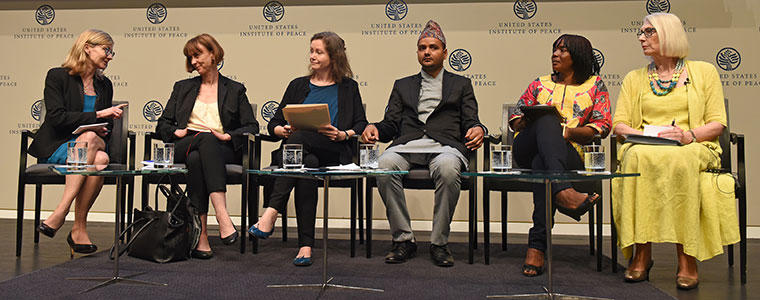In Fragile States, Put Citizen Involvement First, Panel Says
Inclusion, not services, is key to strengthening legitimacy and building peace
A common strategy for state-building and development aid to transitional nations—getting basic services to the population—will fail to establish a government’s legitimacy unless citizens are included in the process, a leading researcher on conflict management said at the U.S. Institute of Peace.

Contrary to a conventional wisdom in donor countries, research shows that the provision of services—including health care, water and education—has far less impact in creating legitimacy for fragile states than a displayed ability to manage conflicts, Eileen Babbitt, director of the Institute for Human Security at the Fletcher School of Law and Diplomacy said. She spoke at USIP alongside other specialists on new approaches to building peace in “fragile” states—those that risk violent conflicts because their governance is ineffective or seen as illegitimate by their citizens.
“What creates legitimacy was people participating in the design of services at the community level and having a mechanism for expressing grievances if they weren’t adequate,” said Babbitt, describing a study she’s involved with. “This was the only relationship that actually mattered.”
Concepts of inclusion, accountability and fighting corruption—and their link to violent conflict and resulting humanitarian need—moved toward center stage at the World Humanitarian Summit in Istanbul this month, said USIP President Nancy Lindborg. The leaders most focused on the interconnection of those forces are at the helm of fragile states, including Tunisia, Mali and Somalia, she observed.
The May 26 discussion at USIP was part of the annual conference of the Alliance for Peacebuilding, a network of more than 100 organizations involved in areas including development, conflict mitigation, academia, environmental work, citizen protection and business.
Research by the Institute for State Effectiveness also has shown the critical role of community engagement and consultation in shoring up fragile states, said Clare Lockhart, the institute’s CEO. Lockhart, the co-author with Afghan President Ashraf Ghani of the 2008 book Fixing Failed States, has been exploring success and failure in state-building over the past decade. A significant mistake of the Millennium Development Goals set out by the United Nations in 2000 was to focus on primary education and young children without giving enough consideration to young adults, she said.
“Young people want political engagement, but what avenues are provided for it?” Lockhart aksed. “We need to think politically: How do national agendas get set and how do we engage all the stakeholder groups?” she said.
The United Nations increasingly recognizes that successful development and conflict mitigation comes up from grass roots as well as down from political leadership, Lockhart said.
The failures spawned by lack of inclusiveness are easily demonstrated, said Grace Yeah Yeanay Mayson, the Liberia country director for the Purdue Peace Project. After Liberia’s civil war, a “major NGO” decided that a blacksmithing project in a particular county would help develop the economy and reduce political tensions, she said. The group built the project without engaging local citizens and the rituals demanded by their culture. Years later, the facility sits unused, a monument to exclusion.
“We sit in big offices in New York or Monrovia or Johannesburg and get information from the Internet,” Mayson said. “That will let you write a fabulous proposal. But the biggest mistake was not to go on the ground.”
Sarah Cliffe, the director of New York University’s Center on International Cooperation, cited an evaluation of fragile states’ progress that reached a similar conclusion. It suggests that donors have focused too heavily on pushing for capacity in governmental functions. And they have given too little attention to seeking the inclusion of citizens, and accountability and less corruption in government, she said. That is what happened in Iraq after the overthrow of the Saddam Hussein regime “with disastrous results,” she said.
Cliffe’s organization concluded that elections held soon after the end of violent conflicts usually exacerbate political tension. The focus should be on first building political institutions and reliable justice and security for citizens, she said. Yet only 3 percent of aid goes to political projects and 2 percent to non-military security work, she said.
“It’s a hard balance,” Cliffe said. “In Somalia, for example, there was external pressure to make parliament hold the government accountable when the government didn’t really exist!”
Lindborg asked the panel members what advice they’d like to see in a report on improving U.S. effectiveness in fragile states that’s now being prepared for the next administration. USIP, the Carnegie Endowment for International Peace and the Center for a New American Security are partners in the project.
- “There is a great need for community involvement and community inclusion into these processes,” said Mayson.
- Youth and marginalized people need external support to compel the government to listen, said Pradip Pariyar, the founder of the Nepal Policy Center, a youth-led think tank in Kathmandu. That listening, he said, is a key to reducing conflict in his country, which recently emerged from a decade-long civil war.
- “U.S. leadership on this issue matters,” said Lockhart. After the “tough experiences” of Iraq and Afghanistan “now is the time to look for new grounds for confidence.”
- “The aid agenda should focus on the multi-stakeholder process and not simply as a box to check off. These are political processes. They must be understood in depth,” said Babbit.
- If the U.S. could work out the common and distinct challenges in preventing violence, conflict, violent extremism and mass atrocities, the possibilities for averting and addressing each would be enhanced and likelihood of clashing priorities would be reduced, Cliffe said.



